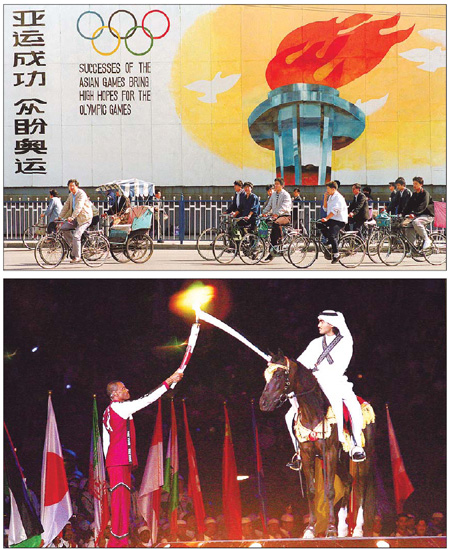
|
Asiad goes from strength to strength
The Asian Games have come a long way since the concept was formalized in New Delhi in 1949. When they open in Guangzhou on Nov 12, more than 14,000 athletes and officials from 45 countries and regions will be involved, competing in a record 42 sports. It will be the biggest Asiad ever with a television audience of billions. In contrast, the first Games in Delhi in 1951 attracted just 11 countries and regions which took part in six sports. The concept though gathered momentum and the 2nd Games in Manila in 1954 highlighted the tournament's growth, with eight additional countries and regions taking part, bringing the tally to 19. Although cycling was dropped, there were eight sports on the program, with the addition of boxing, shooting and wrestling. South Korea, which has been one of the most successful teams at the Games, competed for the first time. Four years later in Tokyo, the numbers had swollen to 1,422 athletes competing, with tennis, volleyball, table tennis, cycling and hockey taking the sports tally to 13. This was also the first time a torch relay took place, adding ceremonial flair to the proceedings. Japan continued its domination of the Games by topping the medal table. Political unrest in Indonesia in 1962 saw the Jakarta Games reduced to 16 nations and regions, but by 1966 the impetus was back again and the Bangkok Games were seen as a big success. India famously beat arch-rival Pakistan by a solitary goal to take the hockey gold. Bangkok again hosted the event in 1970 after South Korea pulled out and the Thais, still enthralled by the atmosphere of four years earlier, were ecstatic about hosting it again. Yachting made its debut, and in a repeat performance of its first Games, the host nation finished third on the medals table. New ground was broken when Teheran was chosen to host the tournament in 1974. It was the largest Asian Games up till then with 25 countries and regions taking part, and the first time it was held in the Middle East . Fencing and gymnastics were added and for the seventh consecutive Asian Games, Japan finished top of the medals table. Back to Bangkok in 1978 when both Singapore and Islamabad pulled out as hosts for financial and political reasons. Archery and bowling were added, which helped boost the number of competitors to more than 3,800. Once again, Japan was triumphant, but China and South Korea were closing the gap, with Japanese domination approaching its end. The 9th Asian Games returned to its roots in New Delhi for the biggest Asiad in history, with more than 4,500 competitors from 33 countries and regions. While fencing and bowling were dropped, equestrian, rowing, handball and golf were added, and Japan was finally toppled by China in the gold medal count. Seoul used the 1986 Games as preparation for hosting the 1988 Olympics and for the first time the Games came under the control of the Olympic Council of Asia as media interest began to grow. Martial arts played a more prominent part, with the introduction of judo and taekwondo. China topped the medal tally for the second time in a row. In acknowledgement of China's rise, Beijing played host in 1990 with 37 countries and regions in 27 events. China made it three Games out of three as it again took first place on the medal table. Hiroshima's hosting of the Games four years later signaled the first time they were not held in a capital city. Former republics of the Soviet Union were introduced and Cambodia returned after 20 years. Being the host nation did not help Japan as China again finished first. The Games returned to Thailand for a fourth time in 1998 as rugby, billiards, snooker and squash were added. China, South Korea and Japan maintained their stranglehold in the medal stakes. The 14th Asian Games in Busan, South Korea, featured 38 sports and 420 events, with Afghanistan returning to competitive action. China topped the medal table for the sixth consecutive time, and it did it again in Doha 2006, only the second time the event had been hosted in the Middle East. In Guangzhou, athletes will compete in cricket, dance sport, dragon boat, roller sport and Weiqi for the first time. Go to Forum >>0 CommentsNo comments.
|
|
| Site Map | RSS | Newsletter | Work for Us Copyright ? China.org.cn. All Rights Reserved 京ICP證 040089號(hào) |
 0
0 







